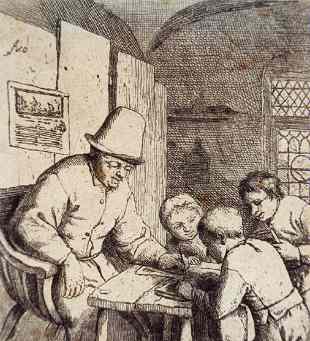The education of boys
Education for all children in the sixteenth and seventeenth centuries depended on the financial standing and social class of the family. The main purpose of education was to teach children appropriate behaviour for their social class and to make them useful members of society. (Some might argue that these aims have changed little.)
Teaching techniques relied heavily on memorization and recitation. Students were expected to become proficient in Latin, as it was the language of the educated throughout Europe. The curriculum was conservative, because most of the teachers had received their education in the old system, which concentrated on rhetoric. (For more on the curriculum, go to the section on Shakespeare's schooling.)
Boys usually started at grammar school from the age of six or seven.
A school day
A typical school day would run from 6:00 am to 5:00 pm--a very long day for small children. Discipline was strict, and often involved beatings*. In the lower forms boys studied Latin grammar and vocabulary; in the upper forms, they concentrated on the poetry and prose of writers such as Ovid, Martial, Catullus, and even the contemporary Latin of such writers as Sir Thomas More. It was Elizabethan law that all children under the age of twenty must study the catechism every Sunday and holy day before and after evening prayers.
The future after grammar school for most boys was apprenticeship: they were bound to a master as to a father; and the master, in turn, was responsible for the boy's clothing, food, shelter and training. After seven years of apprenticeship, the boy could become a journeyman and work for wages. It was possible--but rare--for boys of poorer families to attend university through a scholarship or financing from a wealthy patron.
An alternative to grammar school*.
Footnotes
-
Behaviour modification
The scholar is commonly beat for the making, when the master is more worthy to be beat for the mending, or rather marring of the same: the master many times being as ignorant as the child.
(Ascham, The Schoolmaster). -
Alternative schooling
The children of noble or wealthy families were often sent--while still very young--to distant households to serve as pages. There they would learn to read and write, and would practice the skills expected of young nobles: fencing, hawking, horse-riding and so on. These children often saw very little of their parents (who might have other children as pages).
